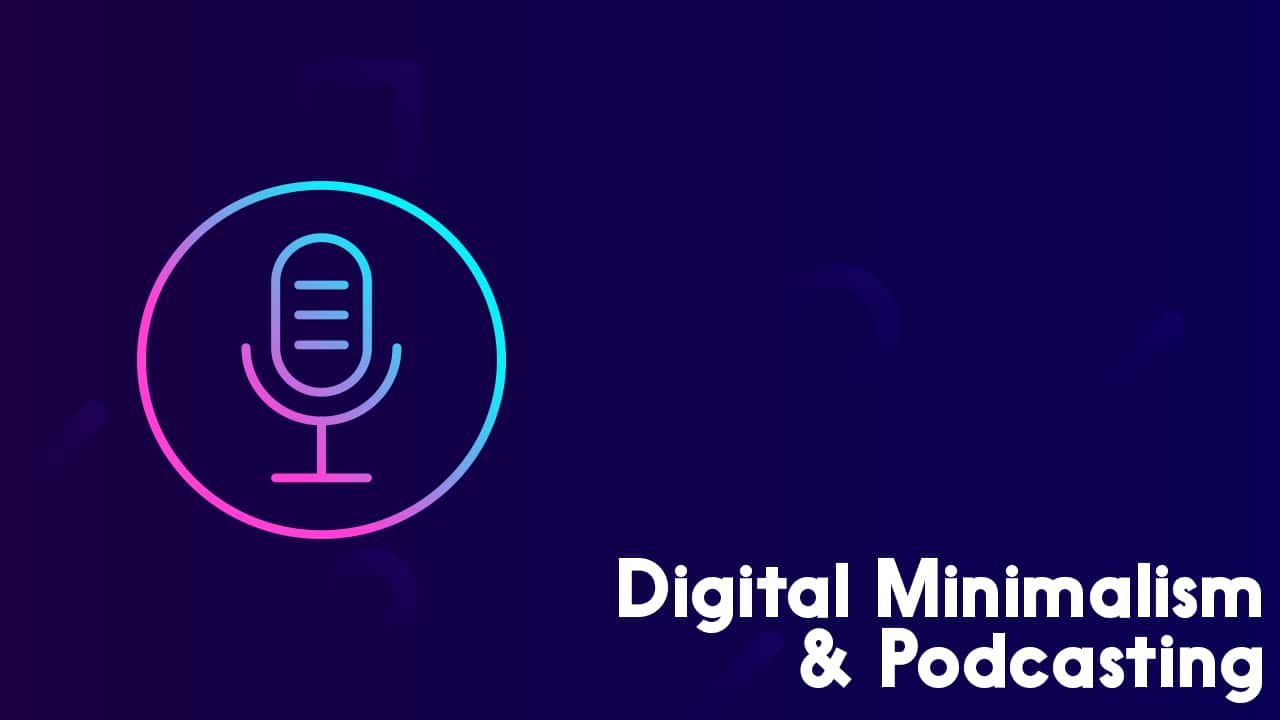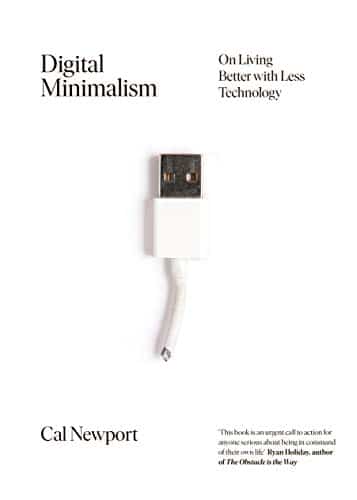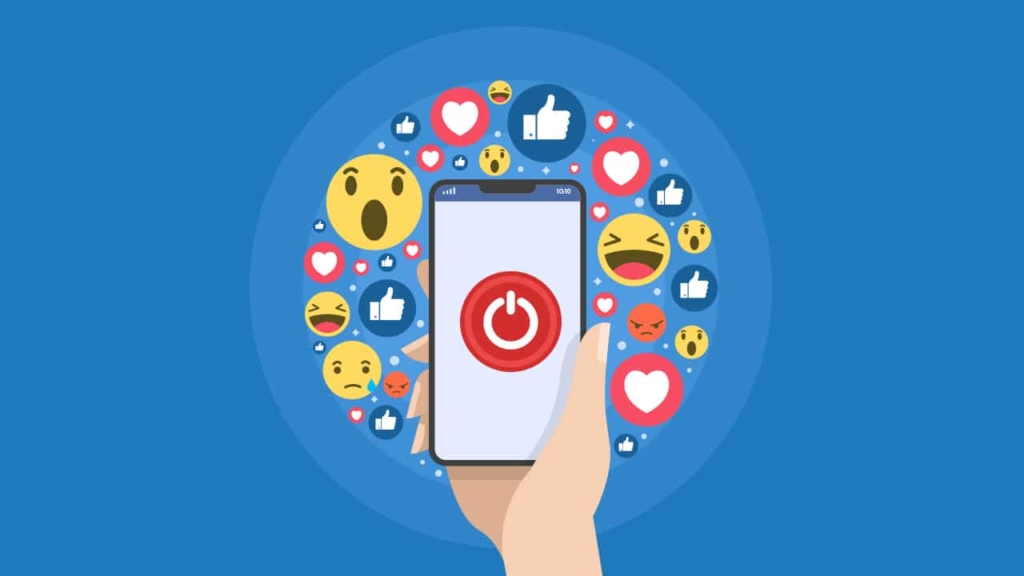Digital Minimalism & Podcasting | Could You Achieve More by Doing Less?

Digital Minimalism: A philosophy of technology use in which you focus your online time on a small number of carefully selected and optimized activities that strongly support the things you value, and then happily miss out on everything else.
Cal Newport, Digital Minimalism

Cal Newport’s book Digital Minimalism is essential reading for folks who feel like they never have enough time for things they need to do, and things they want to do. It’s all about living better with less technology, and was the perfect compliment to another of his titles, Deep Work.
This isn’t intended to be a review of Digital Minimalism. It’s more about how the book got me thinking of the podcasting medium. This is about what we could learn from this school of thought, both as podcasters, and podcast listeners.
A very quick summary of Digital Minimalism: it’s not an anti-technology book that encourages you to go and live off-grid in the wilderness. It’s a guide towards a more mindful use of technology. It gets you thinking about every gadget, tool, and app that you use. Cal Newport wants you to review what you’re using, why you’re using it, and how you’re using it.
Mindless use of technology and information consumption can erode away at your time. It can severely impact your family life, friendships, your working life, and your creativity.
So how does podcasting fit in to all this? Let’s start with the listening aspect.
Should You Listen to Fewer Podcasts?
One of the massive benefits of podcasts is that there’s very few times or places you can’t listen to them.
There are so many examples out there of folks who turned long commutes, gym sessions, and various manual tasks into education opportunities. Podcast listeners can learn languages whilst mowing the lawn. They can learn how to build businesses during their morning walk with the dog.
We’ve all boasted as podcast listeners that we’ll never need to “waste time” again. But, have we gone too far in the other direction?
I’m definitely not comparing podcast listening with mindlessly scrolling through Twitter, Instagram, or Facebook. But here’s a hypothetical scenario that might sound familiar.
Sue is a big podcast fan. As soon as she’s out of bed she has a podcast playing, making and drinking her coffee, showering, getting dressed. Her earbuds go in to keep the listening going out to her car, then her phone connects to the car stereo to take her to her work.
Parking up at work, her earbuds go back in to take her all the way to her desk. She then starts her working day. At lunch time, she goes for a walk with her earbuds in. At finishing time, her journey is a reversal of the morning.
This common podcast listener lifestyle was summed up well by Greg Campion in a piece titled The Problem with Podcasts. In this article, Campion asked the question “Is our fascination with efficient content consumption actually adding stress to our lives and impairing our decision-making?”
Have you ever been in the position where a routine household task that should take about 2 minutes has actually taken you 10, because you’ve spent 8 minutes locating your earbuds and finding a podcast to play?
Would taking the bins out really be such a hardship if you just did it without trying to cram in a minute of content consumption?
This issue was dealt with thoroughly in Digital Minimalism too. There are a lot of legitimate concerns out there about the long term impact of never having any time to think, review, or reflect.
It can be likened in some ways to folks who obsessively consume self-help books, but never put anything they’ve learned into action. Sure, you might cram in an audiobook a week, or 30 podcast episodes a day and feel like you’re the efficient master of all learning. But after a while, how much are you actually taking in? What are you really achieving?
I’m as guilty of this as anyone, incidentally. That’s what led me to pick up Digital Minimalism in the first place!
Anyway: what can we do about it?
The Podcast Unsubscribe Challenge
Okay I know. Imagine a podcasting website telling you to listen to less podcasts! But if you cut down on the quantity of your consumption, the quality of your experience will increase. You’ll likely benefit far more from the stuff you do listen to.
Here are some questions to ask yourself
- How much time on average per day do you listen to podcasts?
- How much “downtime” do you give your brain? Time where you’re not consuming any information. This doesn’t include time asleep.
- How many active podcasts are you subscribed to?
- What do you get out of each one? These can be things like education, motivation, help with something, or general entertainment.
- Do you also juggle your podcasts with non-fiction audiobook listening?
In Digital Minimalism, Cal Newport recommends you do a digital de-clutter where you remove all apps and social media from your life for a month, then re-add anything you realised you can’t function without.
I absolutely don’t think you should delete your listening app for a month. But how about unsubscribing from, say, all but 3 podcasts? After 30 days, you can start to add back in the ones you really missed.
The alternative is to make sure you have at least an hour a day to give your brain a rest from consuming info. Go for a walk and don’t take your earbuds. Or prep and eat your breakfast with some music on instead. Spend a bit of time thinking about the day ahead.
Digital Minimalism for Podcasters
That’s the listening side of things. But what about those who actually create podcasts? There’s a lot of roadblocks here.
Most podcasters feel under pressure to keep their show visible amongst the noise. New podcasts are launched every day. There’s also been an increase in big money network outfits arriving on the scene. These shows have advertising teams and money to spend. Out the blue, their logo is splashed everywhere, and they get coverage in the mainstream media.
The average podcaster meanwhile, is a team of one. They are the presenter, producer, webmaster, and head of marketing. All this whilst juggling work and family life.
Podcasters do the bulk of their marketing and promotion on social media, and try to “stay relevant” by engaging in as many online communities and conversations as possible.
So, what’s the knee-jerk response to the almost daily announcement that a well known podcast network has announced yet another new true crime show, featuring someone you’ve heard of? Many podcasters think “well, I better up my social media game”.
This means more posts per day, more checks per day, more attempts to engage in online chatter. It means joining and participating in more groups or communities. There are Slack channels, Discord servers, WhatsApp group chats to follow. Every one of them is well-meaning, with the lure of being “a place to just hang out and chat about the craft.”
But do the negatives of being active in all these groups outweigh the positives?

What’s the Alternative?
Okay, so it’s probably a good idea to have some online and social media presence for your podcast. But is there a better way to manage it all?
For example, maybe you can dedicate 30mins a day to check in, post something, and respond to anything directed at you. A good tip in Digital Minimalism was to delete apps like Twitter and Facebook from your phone, and to do these check ins on an actual computer. This means it’s a lot more deliberate, and prevents knee-jerk scrolling whilst waiting in line for your coffee.
If the thought of your accounts not being “responsive” for most of the day gives you the fear, could you partner with some other podcasters and arrange days/times where you each take on the social media responsibilities for everyone’s show?
For the online community aspect, an option might be to quit all but one, and only check in there on a pre-planned schedule, and for a short and set amount of time. It’s also worth checking to see if there’s a local podcasters group in your area. If not, you could even look at setting one up. Real life engagement and community will outweigh the online stuff, and be far more rewarding in the long run.
Digital Minimalism & Podcasting
Every podcast and podcaster is different, and this is far from my own area of expertise. If the issues here resonate with you, only you yourself can figure out a system that truly works for you.
In Deep Work, Cal Newport said that “Clarity about what matters provides clarity about what does not.” Maybe a good starting point.
In terms of running your podcast, you could think about the stuff that really moves the needle. Prioritise creating good content. That means, planning, recording, editing. You could even look at podcast advertising options which let you step away from social without feeling like you’re going to vanish from everyone’s mind.
There’s the education side of things too. Reading how-to articles on this site, for example. You could use an app like Instapaper to download everything that interests you each week. With Instapaper you can build a reading list and send it to your Kindle. Then, you can go for a coffee, and do your reading offline.
If all the new podcasting articles and industry news you see are via your Twitter feed, consider signing up to some email newsletters instead. These can give you a regular digest of everything you need to know, and you can browse them at your own convenience.
That’s some podcast-specific stuff that might work for you. Though I’d still definitely recommend getting yourself a copy of both Digital Minimalism and Deep Work. This stuff is Cal Newport’s bread and butter, and there’s a lot more to this topic.
I, meanwhile, am just a guy who sends screenshots of memes to group chats when I should be working.
But I hope that if we can all just be a bit more mindful, a bit more efficient, a bit happier, then the podcast medium as a whole could benefit tremendously from it.
Starting a Podcast? Start Here
Getting the planning and strategy stuff nailed down from the very beginning can go a long way towards podcasting effectively and efficiently.
In our free Step-by-Step Guide on How to Start a Podcast, you’ll find all the info you need to organise your workflow. It’ll help you build your content on a solid foundation and take you all the way to the marketing, promotion, and growth stuff.
Stick it on your Instapaper list and set some time aside to read through it.
Now step away from the screen, and go for a walk 😉
